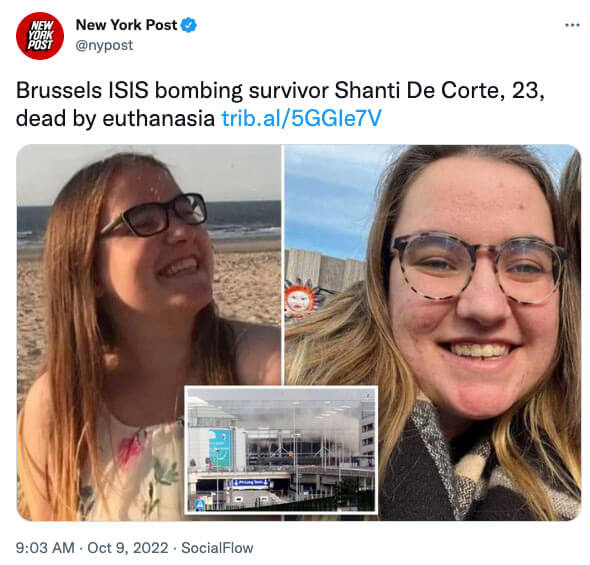Belgium – physically healthy 23 yr old woman suffering PTSD is euthanised
Yet another tragic story that highlights the dangers of liberal euthanasia laws (aka “assisted suicide”).
A Belgian woman, aged 23, was recently euthanised after being ‘traumatised’ by the 2016 ISIS attack on Brussels Airport. She was physically healthy but was euthanised due to ongoing mental health issues.
Shanti De Corte developed depression and post-traumatic stress disorder (PTSD) after being caught up in ISIS attack on Brussels Airport, which killed 32 people. She survived the March 2016 terrorist attack, but ongoing depression and PTSD led to her request to die being approved by psychiatrists. She was then euthanised on May 7 this year.
Read full story here.
Renowned Belgian neurologist, Paul Deltenre argued that euthanasia should not have been authorised because some therapeutic options had not been made available to the Ms De Corte to treat post-traumatic stress wounds.
This highlights how easily euthanasia laws can be loosened over time to include those with mental health problems. Under Belgian law, euthanasia is allowed to a person in ‘a medically futile condition of constant and unbearable physical or mental pain that cannot be alleviated’. There is no lower age limit.
Andrea Williams of Christian Concern said:
“It is truly shocking that an otherwise healthy, but traumatised 23-year-old was euthanised rather than cared for. With proper help, she could have lived a long, fulfilling life. This case shows how slippery the slope is once you allow euthanasia in law.”
According to our own Ministry of Health “Assisted dying involves a person who is experiencing unbearable suffering from a terminal illness taking or being given medication to end their life. There are strict eligibility criteria to have an assisted death.”
But how long before our euthanasia laws are loosened to include cases such as Shanti De Corte?
As this case in Belgium proves, pressure intensifies over time to include more people and more conditions. The laws are inevitably loosened and broadened.
Medical care and expert psychological therapies should be the preferred treatment, not euthanasia.
**The post was written by Family First staff writers.







